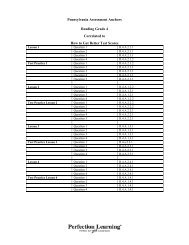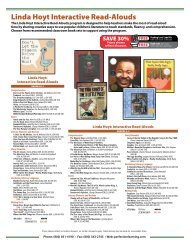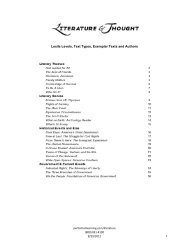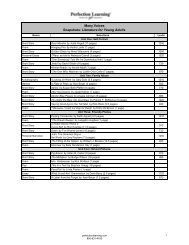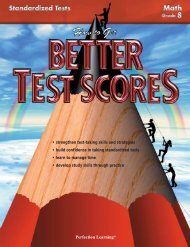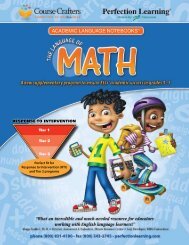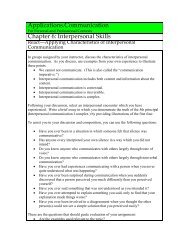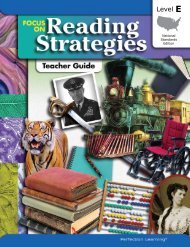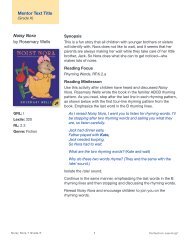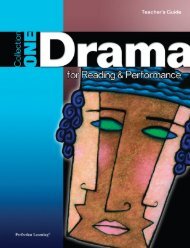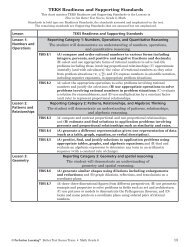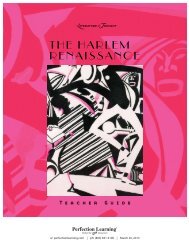Contemporary ClassicsâThe Giver - Perfection Learning
Contemporary ClassicsâThe Giver - Perfection Learning
Contemporary ClassicsâThe Giver - Perfection Learning
You also want an ePaper? Increase the reach of your titles
YUMPU automatically turns print PDFs into web optimized ePapers that Google loves.
Masterprose<br />
<strong>Contemporary</strong> Classics<br />
C O N T E N T S<br />
Left Pocket:<br />
Teacher Resources<br />
Q-Note<br />
Biographical information<br />
Plot synopsis<br />
Stylistic analysis<br />
Author picture<br />
Guidon<br />
Glossary of helpful literary terms<br />
Chapter-by-chapter or scene-by-scene<br />
study questions and responses<br />
Comprehensive discussion questions<br />
and responses<br />
Enrichment activities<br />
Word Study and responses<br />
Essay, Objective, and Final Test<br />
questions and responses<br />
Response Key<br />
Answers to the Chrono Log, Word<br />
Study, Objective Test, and Final Test<br />
Generic Video Guide<br />
Questions and activities for previewing,<br />
during viewing, and postviewing<br />
Right Pocket:<br />
Reproducible Tests and Activities<br />
Transume<br />
Analysis of character or plot evolution<br />
Chrono Log<br />
Activity tracing plot developments<br />
Study and Discussion Questions<br />
Reproducible questions from the Guidon<br />
with space for students to respond<br />
Enrichment Activities<br />
Word Study<br />
Essay Tests<br />
Questions at the Literal and Interpretive<br />
levels<br />
Objective Test<br />
Final Test<br />
PERFECTION LEARNING ® CORPORATION • LOGAN, IOWA 51546<br />
#79413/61328 © 2003 <strong>Perfection</strong> <strong>Learning</strong> ® Corporation The <strong>Giver</strong> <strong>Contemporary</strong> Classics
<strong>Contemporary</strong> Classics<br />
Study Questions<br />
Name ________________________________<br />
Reproducible<br />
THE GIVER<br />
Chapters 1–4<br />
1. What is significant about the airplane incident in the opening pages of the story<br />
2. Why is Jonas apprehensive about the upcoming Ceremony<br />
3. How are Assignments determined in the community<br />
4. Why does the community value “precision of speech”<br />
5. What are the different ways the community views “release”<br />
6. Explain the role of Birthmother in Jonas’s community.<br />
1<br />
#79413/61331 © 2003 <strong>Perfection</strong> <strong>Learning</strong> ® Corporation The <strong>Giver</strong> <strong>Contemporary</strong> Classics
<strong>Contemporary</strong> Classics<br />
Enrichment Activities<br />
Name ________________________________<br />
Reproducible<br />
THE GIVER<br />
I. Research<br />
1. Research one of the many utopian communities that have been established in the United States<br />
in the last 200 years. Compare the community to the one in the book. Make a generalization<br />
about why such communities may not last.<br />
2. Choose one of the following current social issues and compare today’s attitudes with the<br />
attitudes of Jonas’s community.<br />
• day care<br />
• capital punishment<br />
• volunteerism<br />
• surrogate mothers<br />
• euthanasia<br />
• mothers working<br />
3. Research the process of memory. What enables humans to have long-term memory Why do<br />
some people have better memories than others do How is memory lost<br />
II. Reaction<br />
1. How much do you think the individual should have to “lose” of him- or herself for the good of<br />
society Are there societies today that demand too much of an individual Is American society<br />
one of them<br />
2. Lois Lowry once commented that she gauges her success as a writer by her ability to “help<br />
adolescents answer their own questions about life, identity, and human relationships.” What<br />
questions did the book raise for you To what conclusions did you come<br />
3. Select an interesting passage from the book and read it aloud—for example, Chapter 19 in<br />
which Jonas witnesses the release of the identical twin.<br />
4. What might be the advantages of a daily “sharing of feelings” or “telling of dreams” session<br />
Do you think it would work with families today Why or why not<br />
5. The <strong>Giver</strong> was awarded the 1994 Newbery Medal given for “the most distinguished American<br />
children’s book published” that year. In your opinion, what makes this book “distinguished”<br />
How does it differ from others you have read<br />
III. Imagination<br />
1. Decide how you think The <strong>Giver</strong> ended, and then write an additional page or two that clearly<br />
explains your ending. Try to imitate the style of the author. Then decide what the book would<br />
gain or lose by including such an addendum. Does it make sense that this particular book<br />
would have an ambiguous ending Why or why not<br />
11<br />
#79413/61331 © 2003 <strong>Perfection</strong> <strong>Learning</strong> ® Corporation The <strong>Giver</strong> <strong>Contemporary</strong> Classics
Chrono<br />
Log<br />
Name ________________________________<br />
Reproducible<br />
THE GIVER<br />
1. As the story opens, Jonas is apprehensive about ___________________________________.<br />
2. Father brings home a newchild because the child ___________________________________.<br />
3. Jonas remembers that while playing catch with Asher, the apple they were throwing________<br />
___________________________________________________________________________.<br />
4. As a result of his dream about Fiona, Jonas begins taking ____________________________.<br />
5. At the December Ceremony, the Chief Elder announces that Jonas is to become the new<br />
___________________________________________________________________________.<br />
6. While reading his Assignment rules, Jonas is stunned to find out that he is now allowed to<br />
___________________________________________________________________________.<br />
7. At his first training session, Jonas learns of some of the things that existed before the<br />
community went to ___________________________________________________________.<br />
8. When Jonas questions The <strong>Giver</strong> about his unusual vision, The <strong>Giver</strong> tells him he has the rare<br />
ability to____________________________________________________________________.<br />
9. Once Jonas realizes how painful some of the memories are, he________________________.<br />
10. To balance the pain, The <strong>Giver</strong> gives Jonas his favorite memory of _____________________.<br />
11. Jonas finally realizes just how false life in the community is when he sees a tape of his father<br />
___________________________________________________________________________.<br />
12. Jonas and The <strong>Giver</strong> sit up late into the night forming a plan for________________________.<br />
13. When Jonas returns home the next day, he learns that Gabriel ________________________.<br />
14. Instead of carrying out the plan he and The <strong>Giver</strong> have formulated, Jonas steals his father’s<br />
bicycle and _________________________________________________________________.<br />
15. On their journey, Jonas attempts to keep Gabriel comfortable by _______________________<br />
___________________________________________________________________________.<br />
16. When bad weather sets in and Jonas realizes he may not be able to save Gabriel, he uses a<br />
final burst of strength to climb a hill where he finds __________________________________.<br />
17. At the end of the story, Jonas and Gabriel are heading down the hill toward ______________<br />
___________________________________________________________________________.<br />
#79413/61330 © 2003 <strong>Perfection</strong> <strong>Learning</strong> ® Corporation The <strong>Giver</strong> <strong>Contemporary</strong> Classics
The <strong>Giver</strong> Objective Test<br />
Name ________________________________<br />
____39. Women in the community<br />
a. are usually assigned traditional<br />
women’s roles.<br />
b. become Birthmothers, for the<br />
most part.<br />
c. are treated on an equal basis<br />
with men.<br />
d. are the only ones allowed to be<br />
leaders.<br />
____40. Jonas finds The <strong>Giver</strong> to be<br />
a. distant and cold.<br />
b. bitter and mean.<br />
c. cheerful and optimistic.<br />
d. warm and understanding.<br />
Select the one false answer from the choices given.<br />
____41. Jonas’s community assures<br />
conformity by<br />
a. releasing anyone who repeatedly<br />
breaks the rules.<br />
b. using the discipline wand on<br />
children and the elderly.<br />
c. pointing out people’s individual<br />
differences.<br />
d. issuing special clothing to different<br />
age groups.<br />
____42. The <strong>Giver</strong>’s job is to<br />
a. contain pleasant memories.<br />
b. advise the Committee of Elders.<br />
c. contain unpleasant memories.<br />
d. make suggestions for change in<br />
the community.<br />
____43. When the community went to<br />
Sameness, it lost<br />
a. modern transportation of all forms.<br />
b. climate.<br />
c. color.<br />
d. the luxury of choice.<br />
____44. At the December Ceremony<br />
a. outstanding achievements by<br />
community members are<br />
recognized.<br />
b. the Twelves receive their<br />
Assignments.<br />
c. the Nines receive the bicycles.<br />
d. the newchildren are named.<br />
____45. Jonas’s community discourages<br />
individualprivacy by<br />
a. forbidding locked doors.<br />
b. installing cameras throughout the<br />
community.<br />
c. equipping each household with a<br />
speaker.<br />
d. requiring Stirrings to be reported.<br />
____46. An Assignment can be based on<br />
a. talents of the individual.<br />
b. the Committee’s observations.<br />
c. preference of the individual.<br />
d. interests of the individual.<br />
____47. Jonas’s community reduces conflict<br />
within the community by<br />
a. enforcing strict rules that require<br />
polite behavior.<br />
b. allowing opponents to present their<br />
problems to the Committee of<br />
Elders.<br />
c. requiring families to have telling of<br />
feelings sessions.<br />
d. enforcing strict standards of con<br />
formity.<br />
____48. After Jonas receives his Assignment, he<br />
a. drifts away from his friends.<br />
b. loses interest in school.<br />
c. feels removed from the rest of the<br />
community.<br />
d. no longer dreams.<br />
____49. Jonas’s training with The <strong>Giver</strong> causes<br />
him to<br />
a. gain a greater respect for Sameness.<br />
b. experience true suffering and joy.<br />
c. question the way things are in the<br />
community.<br />
d. long for the way things were in the<br />
past.<br />
____50. The actual purposes of “release” are to<br />
a. punish those who don’t conform.<br />
b. allow people to go to another<br />
community to live if they aren’t<br />
happy.<br />
c. eliminate those who don’t meet the<br />
community’s standards.<br />
d. eliminate the elderly when they<br />
reach a certain age or health<br />
condition.<br />
3<br />
#79413/61334 © 2003 <strong>Perfection</strong> <strong>Learning</strong> ® Corporation The <strong>Giver</strong> <strong>Contemporary</strong> Classics
<strong>Contemporary</strong> Classics<br />
Word Study<br />
Name ________________________________<br />
Reproducible<br />
THE GIVER<br />
Choose the letter of the word or phrase that comes closest to the meaning of the main word.<br />
Chapters 1–4<br />
1. palpable<br />
a. real<br />
b. frightening<br />
c. temporary<br />
d. pleasurable<br />
2. apprehensive<br />
a. responsible<br />
b. alone<br />
c. fearful<br />
d. incapable<br />
3. pondered<br />
a. considered<br />
b. carried<br />
c. robbed<br />
d. stumbled<br />
4. transgression<br />
a. betrayal<br />
b. falsehood<br />
c. wrongdoing<br />
d. annoyance<br />
5. chastisement<br />
a. praise<br />
b. announcement<br />
c. opportunity<br />
d. scolding<br />
6. petulantly<br />
a. irritably<br />
b. stubbornly<br />
c. tearfully<br />
d. cleverly<br />
7. hoarded<br />
a. forced<br />
b. collected<br />
c. lifted<br />
d. offered<br />
8. nondescript<br />
a. adorned<br />
b. ruined<br />
c. plain<br />
d. poverty-stricken<br />
9. gravitating<br />
a. leaning away<br />
b. wandering<br />
around<br />
c. forcing away<br />
d. being drawn<br />
10. chortled<br />
a. plunged<br />
b. croaked<br />
c. flung<br />
d. chuckled<br />
Chapters 5–8<br />
11. interdependence<br />
a. mutual<br />
agreement<br />
b. mutual interest<br />
c. mutual reliance<br />
d. mutual<br />
cooperation<br />
12. reprieve<br />
a. dismissal<br />
b. postponement<br />
c. relaxation<br />
d. alternative<br />
13. relinquish<br />
a. enjoy<br />
b. deny<br />
c. divide<br />
d. surrender<br />
14. congregated<br />
a. rushed<br />
b. gathered<br />
c. attached<br />
d. assured<br />
15. meticulously<br />
a. precisely<br />
b. clearly<br />
c. eagerly<br />
d. suspiciously<br />
16. profound<br />
a. unworthy<br />
b. fortunate<br />
c. extreme<br />
d. dangerous<br />
17. retroactive<br />
a. applying to all<br />
b. applying to a<br />
prior period<br />
c. applying to<br />
a few<br />
d. applying to<br />
the future<br />
18. crescendo<br />
a. steep drop<br />
b. trying<br />
experience<br />
c. gradual<br />
increase<br />
d. severe incline<br />
19. benign<br />
a. overdue<br />
b. mature<br />
c. deadly<br />
d. kind<br />
20. indolence<br />
a. laziness<br />
b. rudeness<br />
c. determination<br />
d. courage<br />
Chapters 9–12<br />
21. requisitioned<br />
a. questioned<br />
b. requested<br />
c. required<br />
d. pleaded<br />
22. intricate<br />
a. flimsy<br />
b. bright<br />
c. detailed<br />
d. soft<br />
23. conspicuous<br />
a. obvious<br />
b. troubling<br />
c. astonishing<br />
d. difficult<br />
24. diminish<br />
a. resemble<br />
b. offend<br />
c. protect<br />
d. fade<br />
25. successor<br />
a. follower<br />
b. victor<br />
c. leader<br />
d. relative<br />
26. exhilarating<br />
a. tiring<br />
b. far-reaching<br />
c. enlivening<br />
d. risky<br />
#79413/61332 © 2003 <strong>Perfection</strong> <strong>Learning</strong> ® Corporation The <strong>Giver</strong> <strong>Contemporary</strong> Classics
GUIDON<br />
A Teacher’s Supplement<br />
THE GIVER<br />
A SHORT GLOSSARY OF LITERARY TERMS<br />
Some of the terms listed here may be useful in discussion of this<br />
literary work.<br />
Characterization is the creation of believable fictitious personalities.<br />
The basic methods of characterization include:<br />
• an explicit statement by the author<br />
• the character’s appearance<br />
• the aspects of setting which reflect influence of the character<br />
• the character’s actions, including mannerisms<br />
• reactions of and to the character<br />
• the character’s thoughts<br />
• what the character says<br />
• what others say about the character<br />
Conflict results from the struggle of two opposing forces. One of<br />
the forces is usually a person. That person usually confronts one<br />
or more of five basic kinds of opposition. Opposition includes other<br />
people, forces of nature, society, fate, and internal elements battling<br />
for control.<br />
Foreshadowing is the literary technique of presenting hints or<br />
suggestions of upcoming events in the plot.<br />
Imagery is the use of vivid, descriptive language to create meaningful<br />
“word pictures” in a literary work.<br />
Pathos, from the Greek root word for suffering or deep feeling,<br />
occurs when the audience experiences the emotions of pity, tenderness,<br />
or sorrow. Pathos is marked by acquiescence or helplessness,<br />
without the catharsis of tragedy.<br />
Plot is the progression of events in a literary work. Each part of the<br />
plot is so essential that if one part were removed, the whole structure<br />
would be disturbed.<br />
Point of View is the particular vantage point the author provides for<br />
the reader to observe the events of a story.<br />
Setting is the time and place of a narrative. The physical aspects of<br />
setting include time of day or other particulars of the environment,<br />
such as location, topography, and the placement of objects. The<br />
intangibles of setting include lifestyle and the predominant emotional<br />
or moral atmosphere.<br />
Symbolism is the use of one thing to suggest something else;<br />
specifically, symbols are used to represent abstract ideas in concrete<br />
ways.<br />
Theme is a main idea, either stated or unstated, of a literary work. A<br />
theme is seldom presented word for word, but is more often an<br />
abstract idea, inferred from characters’ actions and dialogue and the<br />
use of literary devices such as symbols and recurring images.<br />
#79413/61327 © 2003 <strong>Perfection</strong> <strong>Learning</strong> ® Corporation The <strong>Giver</strong> <strong>Contemporary</strong> Classics
STUDY QUESTIONS<br />
Chapters 1–4<br />
1. What is significant about the airplane incident<br />
in the opening pages of the story<br />
The incident could be significant in one of two<br />
ways. If the Pilot was a member of the community,<br />
as the Speaker claimed, the incident<br />
points out how strict the community’s standards<br />
are and how easily people are released. In this<br />
case, the Pilot was released for making a simple<br />
“wrong turn.” If the Pilot was not a member<br />
of the community, the incident shows how distrustful<br />
of others and how protective of itself the<br />
community is.<br />
2. Why is Jonas apprehensive about the<br />
upcoming Ceremony<br />
Because Jonas turns 12 this year, he will<br />
receive his Assignment at the Ceremony. Jonas<br />
knows that the Assignment will define his role<br />
within the community for the rest of his life. He<br />
is apprehensive because he has no idea what<br />
the Assignment will be and is afraid that he<br />
might be disappointed in it. Also, the Ceremony<br />
marks the end of childhood and the beginning<br />
of adulthood for 12-year-olds, and Jonas is naturally<br />
nervous about reaching this milestone.<br />
3. How are Assignments determined in the<br />
community<br />
Children are carefully observed during their<br />
formative years by the Committee of Elders.<br />
The Committee notes each child’s interests,<br />
talents, strengths, and weaknesses, and also<br />
meets with child’s teachers. The Committee<br />
then assigns each 12-year-old his or her role in<br />
the community based on these observations<br />
and consultations.<br />
4. Why does the community value “precision<br />
of speech”<br />
Daily life in the community is, essentially, exclusive<br />
of emotion. Requiring members to use<br />
words that convey exact meaning reinforces<br />
that kind of existence since emotions can be<br />
confusing and, as such, are often expressed<br />
imprecisely. Precision of speech leaves no<br />
room for interpretation of feelings.<br />
5. What are the different ways the community<br />
views “release”<br />
Release for the very young who do not meet<br />
the standards of the community is accepted but<br />
is viewed with sadness because the newchildren<br />
are innocent of any wrongdoing. Release<br />
of the elderly is viewed with honor and as a celebration<br />
of their lives. Release of one who<br />
offends the community by breaking the rules or<br />
making mistakes is viewed as an unspeakable<br />
disgrace.<br />
6. Explain the role of Birthmother in Jonas’s<br />
community.<br />
As Jonas’s mother says, the role of Birthmother<br />
has very little honor. While Birthmothers are<br />
pampered during their reproductive years, they<br />
are never allowed to see the children they give<br />
birth to and, ironically, never become part of a<br />
family unit. Instead, after three births, they<br />
become Laborers in the community. The children<br />
they give birth to are raised for the first<br />
year by Nurturers in the Nurturing Center and<br />
are then assigned to “appropriate” family units.<br />
The children have no idea who their biological<br />
mothers are and have no contact with them.<br />
7. How is conformity encouraged in the community<br />
Offenders of minor rules can be chastised via<br />
the public announcement system. While no<br />
names are mentioned, everyone is aware of<br />
who the offender is, and the humiliation serves<br />
to correct the offensive behavior. Offenders<br />
might also be required to offer the standard<br />
apology to those they have offended or inconvenienced.<br />
Major offenders are given two<br />
chances to reform. After that, they are automatically<br />
released from the community. Conformity<br />
is further encouraged through dress. All community<br />
members dress alike according to their<br />
ages and all wear identification badges.<br />
8. What is the purpose of the telling of feelings<br />
session<br />
The telling of feelings session encourages<br />
community members to look at everything from<br />
an analytical point of view rather than an emotional<br />
one. After the evening meal, everyone is<br />
required to express any strong feelings they<br />
experienced that day. The rest of the family unit<br />
then attempts to help him or her analyze the<br />
feelings by finding the source of them and<br />
offers suggestions as to what can be done to<br />
avoid such feelings in the future.<br />
#79413/61327 © 2003 <strong>Perfection</strong> <strong>Learning</strong> ® Corporation 3<br />
The <strong>Giver</strong> <strong>Contemporary</strong> Classics



